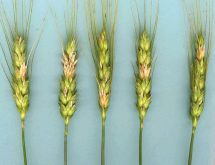Demand for wheat tends to hold steady even in tough economic times, but not so for what’s organically grown.
Demand for organic wheat, durum and barley has flattened since the economic downturn began, Canadian Wheat Board organic marketing manager Patty Rosher said here during an Organic Week seminar Feb. 19, hosted by the provincial Agriculture Department.
“Recession is generally good for wheat sales… organic wheat sales, not so much,” she said.
What’s happening lately is in sharp contrast to just a few months ago, when prices rose dramatically and a big price bubble was developing in North America.
Read Also

Pig transport stress costs pork sector
Popular livestock trailer designs also increase pig stress during transportation, hitting at meat quality, animal welfare and farm profit, Agriculture and Agri-Food Canada researcher says
In spring 2007, farmers were forward contracting at $11-$12 a bushel (f. o. b. farm) for organic wheat; by fall, prices were up to $18 and rising, reaching as high as $30 a bushel with rumours of $32 and $33, Rosher said.
“It was quite a significant price spike.”
But for 2008-09, prices are nowhere near those highs, back down at around $13 to $14 per bushel. “And that’s if anybody is actually buying,” added Rosher. “There really isn’t a lot of movement right now.”
She said in late February she was even skeptical the CWB will put a spring contract out this year because of slow demand. However, she said, “definitely we’ll be in the market.”
The CWB is a small player in organic grains, selling only about three to four per cent of some 110,000 tonnes now produced in Canada.
Rosher also went over details of marketing programs now offered through the CWB for organic grains, including its organic fixed spread contract. Farmers use it by making an up-front payment to the CWB before contracting to sell their grain either domestically or for export. The payment is based on a combination of wheat board premium and market share.
The CWB does get asked why this can’t be offered for conventional farmers, she noted. The reply is that conventional wheat would compete tonne for tonne with CWB sales, while organic wheat doesn’t compete tonne for tonne, she said. “They’re distinct markets.”
The CWB’s organic pilot pooling program began in 2006 on a request by organic farmers wanting the board to sell grain on their behalf.
The CWB has also committed $200,000 under its Organic Sector Market Development Initiative (OSMDI) to support research and market development projects to strengthen the organic grain industry in Western Canada, Rosher noted.



















